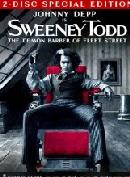HOME PAGE
SITE GUIDE
SEARCH
ADVERTISING AT CURTAINUP
REVIEWS
FEATURES
NEWS
Etcetera and
Short Term Listings
LISTINGS
Broadway
Off-Broadway
NYC Restaurants
BOOKS and CDs
OTHER PLACES
Berkshires
London
California
New Jersey
Philadelphia
Elsewhere
QUOTES
TKTS
PLAYWRIGHTS' ALBUMS
LETTERS TO EDITOR
FILM
LINKS
MISCELLANEOUS
Free Updates
Masthead
Writing for Us
A CurtainUp Los Angeles Review
The Clean House
| I think maybe heaven is a sea of untranslatable jokes. Only everyone is laughing. — Matilde
|
Matilde is from Brazil and, though employed to clean the house of Lane and Charles, she despises cleaning. She parallels Ana, the Argentinan lover of Charles, a 67-year-old breast cancer victim, who is an ebullient life force. The South Americans are contrasted with Norte Americanos Lane, a doctor immersed in her work, and her sister Virginia, a highly educated lost soul whose only salvation lies in cleaning. Charles, also a doctor, falls so desperately in love with his patient Ana that he goes to Alaska to find a life-empowering yew tree but has to learn to fly a plane to extricate the tree. Of course, he arrives too late.
Virginia is a puzzling character. She explains helplessly "I have lost the qualities and temperament that would help me reverse the downward spiral". She and Lane have wonderful moments of confrontation, hissing at each other, snarling to make the subconscious visible. She's married but that doesn't suffice. The author doesn't write her a happy ending but she's involved in the family life.
Charles springs to delighted life after meeting Ana. We see the contrast between him and Lane, whom he always admired but seldom adored.
The play seems split in two. Act One follows Matilde in her search for the perfect joke and contrasts the South American with the North Americans, focusing on Virginia. Act Two is violently hysterical, beginning with the entrance of Charles and Ana and following Ana's illness to the end.
Ruhl writes original characters, sympathetically and perceptively. She sees the wry side, as when Charles leaves Ana and dashes off to Alaska and never stoops to a traditional happy ending for Virginia. Lane is the only character who grows. She douses her self-pity with Martinis and, finally, bonds with Ana.
Elizabeth Liang plays Matilde with a joyful zest. She's a mysterious rather one-note character but Liang is delightful. Colette Kilroy's Lane finds herself on an outrageous path. She buries her sorrows in Martinis, then picks up after Charles as she always has. D. J. Harner, in the performance viewed, plays Virginia, the waifish sister who gave up the study of Greek ruins for cleaning bathrooms. Unlike Lane who proudly states she didn't go to medical school to clean house, Virginia finds the intimate side of cleaning, such as strange female panties in the laundry. Don Fischer makes an ebullient Charles and Denise Blasor an imperious delicious Ana. The stark set, as well as costume design, is by Frederica Nascimento.
Although this play ends on a feeling of completion, the characters may be busy living inner lives somewhere, perhaps plotting a sequel. One can live in hope.
To read a review of the play when it played in New York go here
|
The Clean House Playwright: Sarah Ruhl Director: Stefan Kruck Producer and Artistic Director: Ron Sossi Cast: Elizabeth Liang (Matilde), Colette Kilroy (Lane), D. J. Harner (Virginia), Don Fischer (Charles), Denise Blasor (Ana). Set and Costume Designer: Frederica Nascimento Lighting Designer: Kathi O'Donohue Sound Designer: Sean Kozma Production Stage Manager: Rachel Manheimer Running Time: 90 minutes, one intermission Running Dates: May 15-July 3, 2010 Where: The Odyssey Theatre Ensemble, 2055 S. Sepulveda, Los Angeles 90025. Reservations: (310) 477-2055. Reviewed by Laura Hitchcock on May 15. |
|
Subscribe to our FREE email updates with a note from editor Elyse Sommer about additions to the website -- with main page hot links to the latest features posted at our numerous locations. To subscribe,
E-mail:  esommer@curtainup.comesommer@curtainup.com esommer@curtainup.comesommer@curtainup.comput SUBSCRIBE CURTAINUP EMAIL UPDATE in the subject line and your full name and email address in the body of the message -- if you can spare a minute, tell us how you came to CurtainUp and from what part of the country. Visit Curtainup's Blog Annex Curtainup at Facebook . . . Curtainup at Twitter REVIEW FEEDBACK Highlight one of the responses below and click "copy" or"CTRL+C"
Paste the highlighted text into the subject line (CTRL+ V): Feel free to add detailed comments in the body of the email. . .also the names and emails of any friends to whom you'd like us to forward a copy of this review. |






